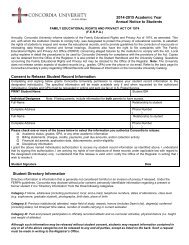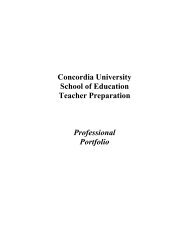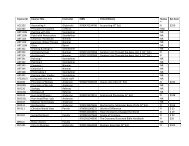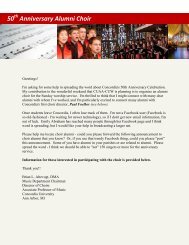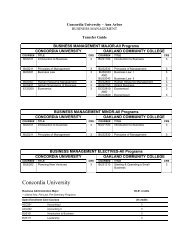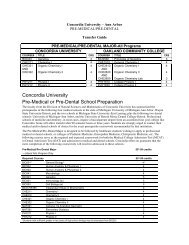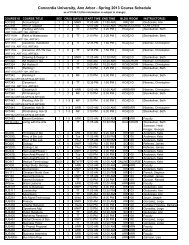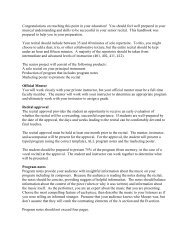2009â2010 Academic Catalog - Concordia University Ann Arbor
2009â2010 Academic Catalog - Concordia University Ann Arbor
2009â2010 Academic Catalog - Concordia University Ann Arbor
You also want an ePaper? Increase the reach of your titles
YUMPU automatically turns print PDFs into web optimized ePapers that Google loves.
<strong>Concordia</strong> <strong>University</strong> <strong>Ann</strong> <strong>Arbor</strong> 2009–2010 <strong>Academic</strong> <strong>Catalog</strong><br />
Public Safety Chief<br />
(Prerequisite – must have either FSC201 or Police Officer Certification prior to admission)<br />
*ACC310 is a prerequisite for PSA401<br />
*COM201 is a prerequisite for COM334<br />
BUS314 Administration of Human Resources 3<br />
COM334* Negotiation, Argumentation & Debate 3<br />
CJA440 Contemporary Issues in Criminal Justice (PD Only) 3<br />
FSC401 Fire Service Company Officer (FD Only) 3<br />
PSA204 Introduction to Public Administration 3<br />
PSA421 Theories of Public Administration 3<br />
PSA401 Financial Management & Budgeting 3<br />
PSA445 Strategic Management & Planning 3<br />
ACADEMIC REGULATIONS<br />
AND PROCEDURES<br />
It is the student’s responsibility to be familiar with all policies and procedures of the university. It is ultimately<br />
the student’s responsibility to meet all graduation requirements. <strong>Academic</strong> policies and procedures are<br />
determined by the faculty to ensure the integrity of the academic program.<br />
Family Educational Rights and Privacy Act (FERPA)<br />
<strong>Concordia</strong> <strong>University</strong> establishes relationships with its students based on their status as emerging adults, and is<br />
committed to fostering their development and self-direction. In this situation, the university expects that its<br />
students will assume primary responsibility for their education and well-being. <strong>Concordia</strong> <strong>University</strong> also<br />
recognizes its obligation to the parents of its students to act in the students' best interest.<br />
In defining the terms of its relationship with students and parents, the university's actions are informed by federal<br />
and state law, including the federal Family Educational Rights and Privacy Act (FERPA). This act ensures that<br />
most communication between a student and the university is considered confidential, and that such information<br />
about a student's experience can be shared with the parents of an individual student only under very specific<br />
circumstances as defined by federal law. All rights accorded a student under this law take effect at the time of<br />
enrollment in a post-secondary educational program regardless of the student.<br />
The purpose of the Family Educational Rights and Privacy Act (FERPA) is to protect the confidentiality of<br />
student educational records. Educational records are those records directly related to students and maintained by<br />
an institution or a party acting for the institution. Personally identifiable student information is protected by<br />
FERPA. Violations of FERPA place the <strong>University</strong> at risk. The penalty for noncompliance can be withdrawal of<br />
Department of Education funds from the institution. In addition, disclosure of student information could subject<br />
both the <strong>University</strong> and the individual disclosing the information to criminal and civil penalties. One of the main<br />
emphases of FERPA is that personally identifiable information may not be released without prior written consent<br />
from the student. However, the university is permitted to disclose student information without written consent to<br />
“school officials” whom the institution has determined have a legitimate educational interest”. Although a person<br />
has been designated as a “school official”, he/she does not have inherent rights to any and all education record<br />
information. Additionally, the school official must demonstrate a legitimate educational interest as opposed to a<br />
personal or private interest and such a determination must be made on a case by case basis. Disclosure to a<br />
school official having legitimate educational interest does not constitute authorization to share that information<br />
with a third party without the student’s written permission.<br />
1. All individuals who are attending or have attended <strong>Concordia</strong> <strong>University</strong> have certain rights with respect to<br />
their educational records.<br />
These rights include:<br />
• Right to review and inspect their educational records;<br />
• Right to request the amendment of their educational records to ensure that they are not inaccurate,<br />
misleading, or otherwise in violation of their privacy or other rights;<br />
Pg. 80 of 118



